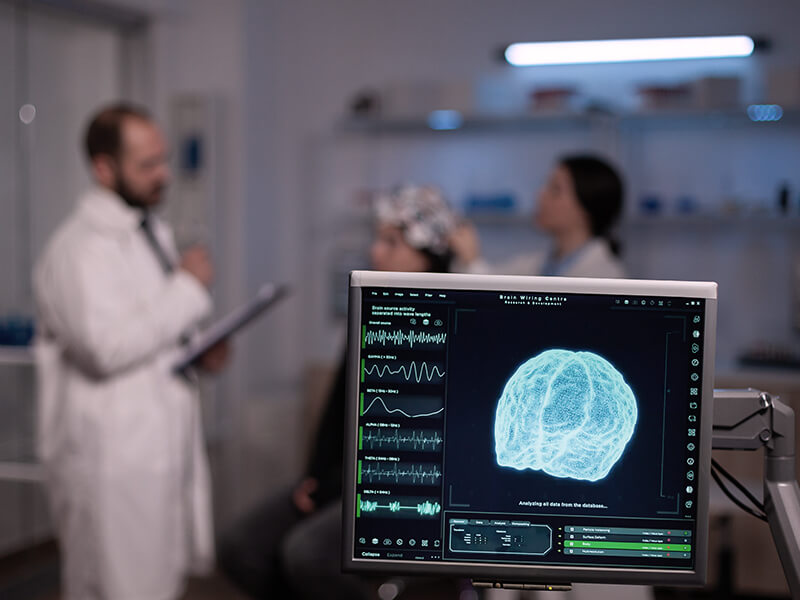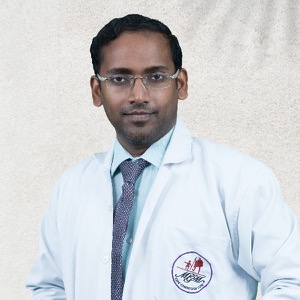MGM Hospital Vashi has been handling neurosurgical emergencies and critical conditions meticulously and with utmost care.
Neurosurgeons at our department are a integral part of multi-disciplinary team which works with experts of several specialties and super-specialties including intensivists to provide patients with complete comprehensive care.
The Department has developed sub-specialty interests in cerebrovascular surgery, spine surgery, skull base surgery, pituitary surgery, and neuro trauma. We also specialize in open, minimal invasive and endoscopic management of neurological diseases.
Highlights
- We are ranked one of the best hospitals for neurology and neurosurgery.
- We have state of the art facilities including image guided surgery, laser ablation and comprehensive intraoperative neuro monitoring.
- We have successfully diagnosed and treated some of the rarest and most challenging conditions.
- Our dedicated trauma team is well versed with the international protocol in trauma management ranging from triage, spine immobilization, stabilization, appropriate imaging and timely surgical intervention if needed.
Services
Open Management of Neurological Diseases
Minimal Invasive Management of Neurological Diseases
Endoscopic Management of Neurological Diseases
Cerebrovascular Surgery
Neuro Trauma
Pituitary Surgery
Skull Base Surgery
Spine Surgery
BRAIN
Brain Tumors
Meningioma, Glioma, Pituitary Adenoma, Schwannoma etc
Infection
Brain Abscess
CSF Disorders
Hydrocephalus, Idiopathic Intracranial Hypertension
Pain Management
Trigeminal Neuralgia
Trauma
Extradural Hematoma, Subdural Hematoma, Contusions, Skull Base Fractures
Epilepsy Surgery
Brain Vascular Malformations and Bleed
SPINE
Congenital spinal disorders
Meningomyelocele/Myelocele
Spinal degenerative disease
Disc prolapse, Spinal Canal Stenosis and Listhesis
Spinal cord tumors
Meningioma, Astrocytoma and Ependymoma
Spinal infection
TB spine
Spinal trauma
Fracture and Dislocations
Spinal Vascular Malformation
AVM, Dural AV Fistula
PERIPHERAL NERVES
Carpal Tunnel Syndrome
Technology & Infrastructure
Our Specialists
FAQs
What is head injury and when to take it seriously?
Since brain is enclosed inside the skull, sudden jerky movement like fall or accident causes damage to brain . Not all head injuries are serious.A simple bang to the head at home may not be actually head injury. Following are the signs which indicate head injury.
- Loss of consciousness lasting for few seconds to hour.
- Amnesia of the event.
- Vomiting.
- Bleeding from ear, nose and throat.
- Convulsion
- Weakness of any part of the body or facial deviation.
- Double vision or blurring of vision.
Any of the above mentioned complaints necessitates a visit to Emergency department for evaluation and observation.
What can I do as the bystander for the head injury victim?
Most common mistake we all do is, give the patient something to eat or drink; which is wrong. If the patient has any of the complain mentioned in the above question, consult emergency department immediately. If the patients is not fully conscious, then turn the patient to one side to prevent aspiration during vomiting or convulsion till u reach the hospital.
What are the different types of head injury?
It can be mild, moderate or severe. It can be open or closed injury. Head injury can cause bleeding and fracture. Bleeding can occur outside the brain like Extradural hematoma, subdural hematoma or it can happen inside the brain like contusions.
What is the treatment for head injury and what is the outcome?
Head injuries are categorized as mild, moderate and severe. Mild and moderate head injury can be treated with medications and observation. Severe head injury most of the time require surgery depending on the location of injury. Outcome of the patient depends on the grade of injury and location of injury and the timely intervention given.
Can surgery help in a head injury?
Absolutely, if surgery is required which normally occurs in cases of EDH, SDH or contusions. it will definitely help in changing the outcome of such patients. Surgery basically helps by reducing the pressure inside the skull by removing the clot or a bone flap thereby preventing injury to the uninjured brain.
Can I become completely normal after treatment?
What are the symptoms of brain tumor?
Below are some major symptoms:
- Intense, prolonged or continuous headache over days or months.
- Vomiting, squinting of eyes asymmetry of face.
- Paralysis or weakness of one side of the body (Hemiparesis).
- Double vision or Diplopia.
- Fits, seizures or convulsions.
What is brain tumor and does it always have a poor outcome?
Is it always necessary to go for radiotherapy and chemotherapy?
Do I need to have surgery for any brain tumor?
What are the causes of a Brain Hemorrhage?
- Hypertension
- Rupture of aneurysm, arteriovenous malformation.
- Cerebral venous sinus thrombosis with venous infarct.
- Patients who on anti coagulation or blood thinner.
- Tumor bleed
- Disorders of Bleeding and Clotting of Blood – Can cause bleeding anywhere in the body including brain.
Depending on the site and size of bleeding, patients can be managed conservatively or surgically. Surgical options available are endoscopic, minimal invasive or open surgeries.


